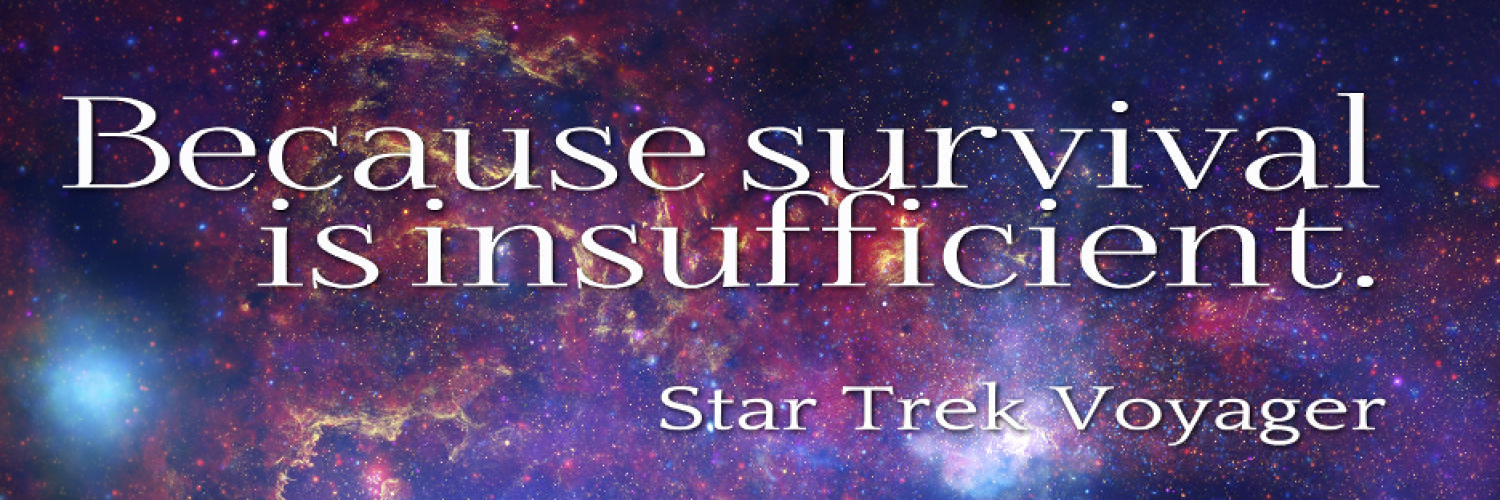Because Survival is Insufficient

Taken from the blog “because survival is insufficient” of Crimson Kas, March 5, 2015
Humanities & Arts Give Meaning
Anyone who has read Emily St John Mandel’s 2014 speculative fiction/apocalyptic future novel Station Eleven will recognize this phrase: “Because survival is insufficient.” It is the motto of the Traveling Symphony, a troupe of actors and musicians who wander the post-apocalyptic landscape of the Great Lakes region of the former United States performing Shakespeare for the survivors of a global pandemic (eerily prescient perhaps?). The motto, seemingly Shakespearean in its elegant simplicity is actually taken from an episode of Star Trek: Voyager, one of the many shows in the Star Trek juggernaut originally created by Gene Rodenberry.
Mandel’s novel has had a resurgence of interest in our own global pandemic moment, as have sales of other dystopian and apocalyptic narratives. There has been speculation about why we look to stories of pandemics amidst our own struggle to adapt to this reality, but what I take away from the desire for narratives is simply this: when we are stressed and need distraction or a way we can make sense of our present reality, we are not turning to scientific journals or scholarly articles: we are looking for arts and humanities.
Don’t get me wrong: I am reading scholarly articles and dipping into scientific journals to learn more about COVID-19—especially in the first two weeks of sheltering-in-place/working from home, I found it impossible to read fiction and, instead, found myself waking up and reading the Imperial College report [NOTE: I don’t recommend making your morning reading a grim report about the rise of cases and deaths globally].
But I have started to dive back into narrative—to allow myself the joy of temporarily finding myself immersed in a storyworld that is outside the realm of my present reality. And I’ve found it necessary to spend time everyday outside, in nature, looking at Boulder Creek, gazing at the Flatiron mountains, or simply just watching a rabbit nibble a dandelion from my screened in porch. I also need art—I have been looking at on-line galleries and watching YouTube videos of the creative ways that artists from around the world have managed to put together performances using technology, creating collaborative beauty from their solitary positions at home.
Before the pandemic shut down the offices at the Center for Humanities & the Arts, we had been working on a three-year strategic plan, including vision and mission statements and a tagline. Over twenty of us worked on these components, talking through word choice, phrasing, and what these would signal about the work that we do as a humanities and arts center. We couldn’t quite agree on a tagline—but the one that I like most is: The Center for Humanities & Arts gives meaning. Because I think that’s just simply true: we turn to humanities and arts to help us interpret the world around us. We rely on arts and humanities to provide us with something beyond our basic needs.
And while we may think that in the midst of a global pandemic, basic needs of food and shelter are all we have time to really consider, as Station Eleven and Star Trek: Voyager remind us, “Survival is insufficient.” History has shown this to be true: people did not stop making art and writing plays, and composing music during times of war or tragedy. Poet friends have commented on Twitter that requests for their poetry or suggestions for poems are on the rise. Arts and humanities give meaning—to our current pandemic situation and to our lives. We need clean water, fresh air, nutritious food, stable shelter AND we need YoYo Ma providing songs of comfort, film festivals that have moved their content on-line, for free, poets sharing their musings with the world, artists reflecting on our present reality, and as these students from Berklee College of Music demonstrate, we need love.
Jennifer Ho
Director, Center for Humanities & the Arts
Professor, Ethnic Studies
Jennifer.Ho@colorado.edu


